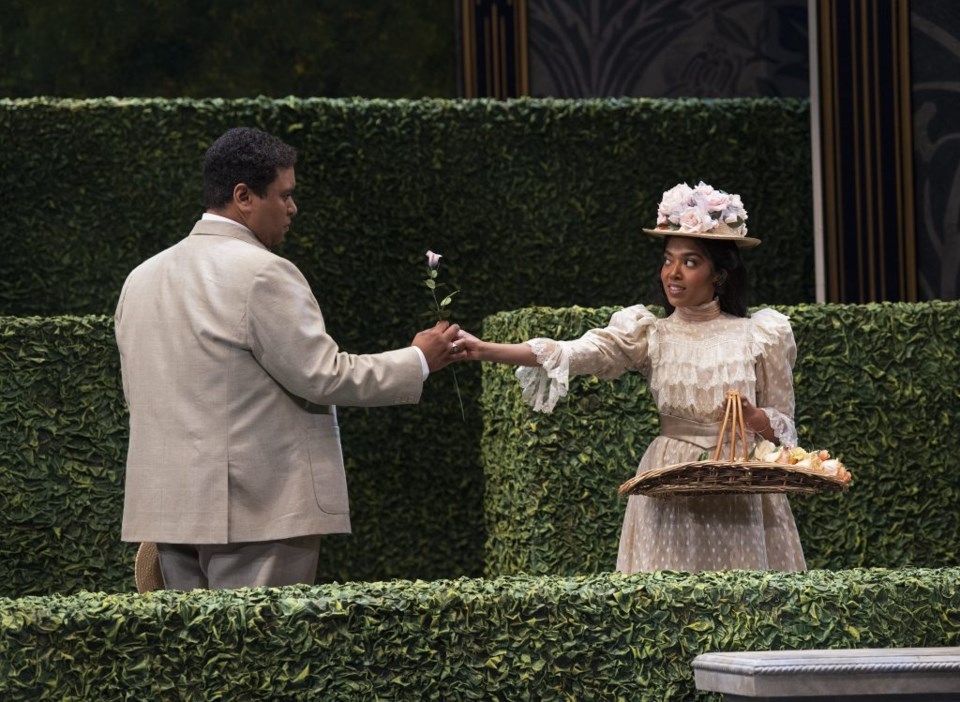
In 60 years of the Shaw Festival, Oscar Wilde’s The Importance of Being Earnest, arguably his most famous play, has only been presented twice.
Wilde’s ‘trivial comedy for serious people,’ now appearing at the Festival Theatre, has only once before been part of Shaw’s playbill. That was in 2004 when former artistic director Christopher Newton returned to helm the production.
With this season dedicated to the memory of Newton, who died in December at 85 years old, perhaps it is fitting that current artistic director Tim Carroll takes a run at the play Newton directed, a play Wilde wrote before scandal derailed both his life and his career.
Some of the reviews of Newton’s version of the play were less than rosy 18 years ago, pointing in particular to the lack of humour in a play intended to be funny.
It’s uncertain whether Carroll read the reviews of his predecessor’s work. If he did, he certainly took heed, as the audience was roaring with laughter at last Friday night’s performance.
The Importance of Being Earnest is a story of deception, hidden lives and double identities. In some ways it mirrors Wilde’s own deceitful efforts, as he hid his affair with the much younger British poet and aristocrat Lord Alfred Douglas. Just weeks after his play’s triumphant London premiere in 1895, his secret life was scandalously exposed by Douglas’ father, the Marquess of Queensberry.
In today’s terms, Wilde was almost immediately ‘cancelled’ from Victorian society. Five years after a very public court proceeding, he died in exile almost penniless.
Like much of Wilde’s work, Earnest at times stands as a scathing indictment of society, presenting characters, such as John ‘Jack’ Worthing and Algernon Moncrief, who can be as unlikeable as they are hilarious. He takes shots at romance, marriage, education, modern culture and ‘German Skepticism’ in this script.
The three-act play begins in Algernon’s flat in London, where Jack, pretending to be his fictional younger brother Ernest back visiting his second home in the country, calls prior to his mission to propose to Moncrief’s cousin Gwendolen Fairfax. Moncrief confronts his friend, having found a cigarette case with an inscription to ‘Uncle Jack’ from ‘little Cecily.’
Exposed, Jack confesses his true identity, explaining to his friend that he uses his ‘brother’ as an excuse to leave his staid life in Hertfordshire. Moncrief, in turn, reveals his own ruse, a fictional invalid friend named Bunbury whom he ‘visits’ whenever he wants to avoid attending a boring societal gathering.
Algernon, in fact, calls this form of deceit ‘bunburying.’
As Algernon, Peter Fernandes chews up the scenery almost as ravenously as he consumes the cucumber sandwiches which are meant for Moncrief’s aunt, Lady Bracknell and her daughter Gwendolen. Fernandes plays the idle young gentleman with much joie de vivre, expertly delivering some of Wilde’s most well-known lines taking aim at the institution of marriage.
Martin Harper plays Jack/Ernest with a suitable stuffiness. Jack sticks to his plan to win the hand of Gwendolen, considering revealing his true identity, until she tells him she had always dreamed of marrying a man named Ernest. Harper, a 17-year Shaw veteran, brings an honest sense of confusion and urgency to the role as he extends his ruse further.
Act II shifts the scene to the gardens outside Jack’s country house in Hertfordshire. Here, the audience is introduced to the diminutive Cecily, played by the wonderful Gabriella Sundar Singh. Cecily is visited by Algernon, who poses as the ne’er-do-well Ernest. Cecily falls for him, excited by the many stories told about Ernest by his ‘older brother.’
In walks Jack being Jack, announcing that his younger brother has sadly passed, only to discover his aristocratic friend now masquerading as Ernest. Harper and Fernandes bring to mind perhaps Jack Tripper and Larry Dallas desperately and hilariously trying to avoid the whole plot blowing up on them in the 1970s sitcom Three’s Company.
As a matter of fact, it’s the other way around, as surely The Importance of Being Earnest and other comedic plays of the time have certainly left their mark on modern day theatre, film and TV for more than a century. Wilde, and indeed Shaw as well, wrote the blueprint for today’s comedies of misunderstanding.
Act III sees the characters in the study inside the country house, where the plot unravels around Jack’s origin story, having been abandoned as a baby in a handbag at a train station. The quips come hard and fast here, leading to the climax at the end, which received uproarious laughter and a standing ovation from the Festival Theatre crowd.
It must be mentioned the trio of Patty Jamieson as the maid, Neil Barclay as the butler Lane, and Adam Sergison (filling in Friday for André Morin) as the footman, brought some lighthearted comic moments. As well, Kate Hennig’s portrayal of Lady Bracknell was perfectly regal and pompous.
Carroll has assembled a cast and crew that bring to rollicking life Wilde’s ‘trivial comedy,’ a work George Bernard Shaw himself did not greatly care for. Perhaps he needed to see this production to truly appreciate it.
The Importance of Being Earnest continues at the Festival Theatre until Oct. 9. The play is two hours and 40 minutes of perfect Victorian farce. At that length, you may be excused if you have to do a little bit of ‘bunburying’ of your own to get out and see it.
For more information or tickets visit shawfest.com or call 905-468-2172.


